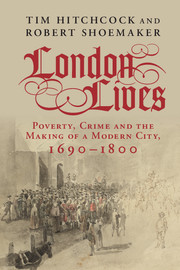Book contents
- Frontmatter
- Dedication
- Contents
- List of figures
- Preface
- Acknowledgements
- List of abbreviations
- 1 Introduction
- 2 Beggarman, thief: 1690–1713
- 3 Protest and resistance: 1713–1731
- 4 Vestries, justices and their opponents: 1731–1748
- 5 Reformers and their discontents: 1748–1763
- 6 Finding a voice: 1763–1776
- 7 The state in chaos: 1776–1789
- 8 Epilogue: The 1790s
- Bibliography
- Index
- References
6 - Finding a voice: 1763–1776
Published online by Cambridge University Press: 05 December 2015
- Frontmatter
- Dedication
- Contents
- List of figures
- Preface
- Acknowledgements
- List of abbreviations
- 1 Introduction
- 2 Beggarman, thief: 1690–1713
- 3 Protest and resistance: 1713–1731
- 4 Vestries, justices and their opponents: 1731–1748
- 5 Reformers and their discontents: 1748–1763
- 6 Finding a voice: 1763–1776
- 7 The state in chaos: 1776–1789
- 8 Epilogue: The 1790s
- Bibliography
- Index
- References
Summary
Introduction
In the late autumn of 1762, Robert Munro was admitted to St George’s Hospital, ‘very Melancholy & dejected’. He was disappointed in his search for work, owed money to a great many and had recently undergone an unsuccessful salivation to cure his venereal disease at the Lock Hospital. His head throbbed with pain. But in his despair, the event that finally drove him over the edge was the casual cruelty of his fellow patients, who ‘told him Fielding was after him’. Munro asked a hospital porter, Roderick McKinnon, if he had spotted Justice John Fielding on the wards, and in response McKinnon advised him that he ‘had better think of his maker’. In the early hours of the next morning, Robert Munro took a razor and cut his own throat. He died six hours later. The subsequent coroners’ inquest found that he had, ‘Cut his throat being a Lunatick’. However, in the hard decades of the 1760s and 1770s, many Londoners must have felt the rising despair that moved Munro’s hand.
The second half of the eighteenth century saw a dramatic decline in real wages for working Londoners (Figure 5.1). From a high point in 1744, wages for bricklayers and carpenters, for example, fell 38 per cent by the end of the century. Much of this decline was concentrated in the period between 1761 and 1774, during which real wages fell by 24 per cent for these same occupations. In part, this was the result of harvest failure and rising food costs, and it was national in scope. The years 1767 and1768 and the winter of 1775/6 all witnessed extreme weather events that affected the harvest and the cost of living. However, these climatic phenomena were essentially temporary in character, and the fall in real wages was exacerbated in London by a growing labour supply fed by in-migration, particularly following demobilisation at the end of the Seven Years War in 1763, and the fact London employers sought to lower their costs in order to respond to new competition from manufacturers operating in the North and overseas. With employers reducing their wages and introducing new working practices, plebeian Londoners found themselves squeezed between lower incomes and periodic sharp increases in the cost of living.
- Type
- Chapter
- Information
- London LivesPoverty, Crime and the Making of a Modern City, 1690–1800, pp. 268 - 332Publisher: Cambridge University PressPrint publication year: 2015



